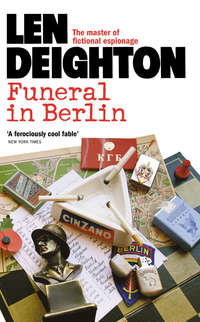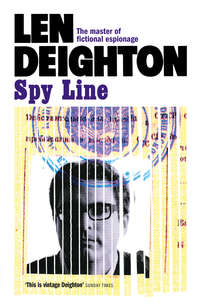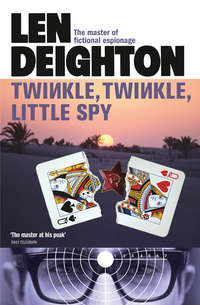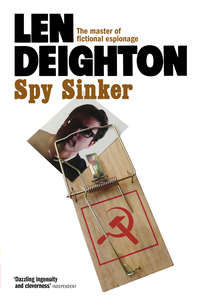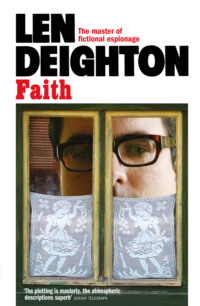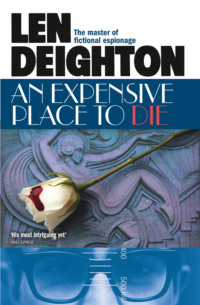
Полная версия
Mexico Set
‘He’s a loner,’ said Werner. ‘He probably would never have spoken to us in the first place except that he mistook Zena for one of the Biedermann girls.’
‘Who are the Biedermann girls?’ said Dicky. After the remains of the lobster course had been removed, the Indian servant brought an elaborate array of Mexican dishes: refried beans, whole chillies and the tortilla in its various disguises: enchiladas, tacos, tostadas and quesadillas. Dicky paused for long enough to have each one identified and described but he took only a tiny portion on his plate.
‘Here in Mexico the chilli has sexual significance,’ said Zena, directing the remark to Dicky. ‘The man who eats hot chillies is thought to be virile and strong.’
‘Oh, I love chillies,’ said Dicky, his tone of voice picking up the hint of mockery that was to be detected in Zena’s remark. ‘Always have had a weakness for chillies,’ he said, as he reached for a plate on which many different ones were arranged. I glanced at Werner who was watching Dicky with interest. Dicky looked up to see Werner’s face. ‘It’s the tiny, dark-coloured ones that blow your head off,’ Dicky explained. He took a large, pale-green cayenne and smiled at our doubting faces before biting a section from it.
There was a silence after Dicky’s mouth closed upon the chilli. Everyone except Dicky knew he’d mistaken the cayenne for one of the very mild aji chillies from the eastern provinces. And soon Dicky knew it too. His face went red, his mouth half opened, and tears shone in his eyes. He fought against the pain but he had to take it from his mouth. Then he fed himself lots and lots of plain rice.
‘The Biedermanns are a wealthy Berlin family,’ said Zena, carrying on as if she’d not noticed Dicky’s desperate discomfort. ‘They are well known in Germany. They have interests in German travel companies. The newspapers said the company had borrowed millions of dollars to build a holiday village in the Yucatan peninsula. It’s never been finished. Erich Stinnes thought I looked just like the younger sister Poppy who’s always in the newspaper gossip columns.’
There was a silence as we all waited for Dicky to recover. Finally he leaned back in his chair and managed a rueful smile. There was perspiration on his forehead and he was breathing with his mouth open. ‘Do you know these Biedermann people, Bernard?’ said Dicky. He sounded hoarse.
‘Have an avocado,’ said Werner. ‘They are very soothing.’ Dicky took an avocado pear from the bowl and began to eat some.
I said, ‘When my father was attached to the military government in Berlin he gave old Biedermann a licence to start up his bus service again. It was one of the first after the war; it started the family fortune, I suppose. Yes, I know them. Poppy Biedermann was having dinner at Frank Harrington’s the last time I was in Berlin.’
Dicky was eating the avocado quickly with his teaspoon, using it to heal the burning in his mouth. ‘That was bloody hot,’ he confessed finally.
‘There’s no way you can be sure which are hot and which are mild,’ said Zena in a gentle tone that surprised me. ‘They cross-pollinate; even on the same plant you can get fiery ones and mild ones.’ She smiled.
‘Could these Biedermann people be interesting to Stinnes?’ said Dicky. ‘For instance, might they own a factory that’s making computer software in California? Or something like that? What do you know about that, Bernard?’
‘Even if that was the case, no point in making contact with the boss,’ I said. I could see that Dicky had focused on the idea of Silicon Valley and it was not going to be easy to shake him off it. ‘The approach would be made to someone in the microchip laboratory. Or someone doing the programs for the software.’
‘We need to know the current situation from the California end,’ said Dicky with a sigh. I knew that sigh. Dicky was just getting me prepared for a sweaty week in Mexico City while he went to swan around in southern California.
‘Talk to the Biedermanns,’ I said. ‘It’s easier.’
‘Stinnes asked about the Biedermanns,’ said Werner. ‘He asked if I knew them. I used to know Paul very well, but I told Stinnes I knew the family only from the newspapers.’
‘Werner, you didn’t tell me you know the Biedermanns,’ Zena interjected excitedly. ‘They are always in the gossip columns. Poppy Biedermann is beautiful. She just got divorced from a millionaire.’
Dicky looked at me and said, ‘Better you talk to Biedermann. No sense in me showing my face. Keep it informal. Find out where he is; go and see him. Would you do that, Bernard?’ It was an order in the American style: disguised to sound like a polite inquiry.
‘I can try.’
Dicky said, ‘I don’t want to channel this through London, or get Frank Harrington to introduce us, or the whole world will know we’re interested.’ He poured himself some iced water and sipped a little. He was recovering some of his composure, when suddenly he screamed, ‘You bastard!’, his eyes fixed on poor Werner and his head thrust forward low over the table. Werner looked perplexed until Dicky, still leaning forward with his head almost on his plate, yelled, ‘That bloody cat.’
‘Cherubino, you’re very naughty,’ said Zena mildly as she bent down to disengage the cat’s claws from Dicky’s leg. But by that time Dicky had delivered a kick that sent Cherubino across the room with a howl of pain.
Zena stood up, flushed and furious. ‘You’ve hurt her,’ she said angrily.
‘I’m awfully sorry,’ said Dicky. ‘Just gave way to a reflex action, I’m afraid.’
Zena said nothing. She nodded and left the room in search of the cat.
‘Paul Biedermann is approachable,’ said Werner, to cover the awkward silence. ‘He arranged a bank guarantee for me last year. It cost too much but he came through when I needed him. He has an office in town and a house on the coast at Tcumazan.’ Werner looked at the door but there was no sign of Zena.
‘There you are, then,’ said Dicky. ‘Get on to him, Bernard.’
I knew Paul Biedermann too; I’d exchanged hellos with him recently in Berlin and hardly recognized him. He’d smashed himself up driving a brand-new Ferrari back to Mexico from a drunken party in Guatemala City. At 120 miles an hour the car had gone deep into the roadside jungle. It took the rescuers a long time to find him, and a long time to cut him free. The girl with him had been killed, but the inquiry had glossed over it. Whatever the truth of it, now one of his legs was shorter than the other and his face bore the scar tissue of over a hundred neat stitches. These infirmities didn’t help me overcome my dislike of Paul Biedermann.
‘Just a verbal report. Nothing in writing for the time being. Not you, not me, not Biedermann.’ Dicky was keeping all the exits covered. Nothing in writing until Dicky heard the results and arranged the blames and the credits with godlike impartiality.
Werner shot me a glance. ‘Sure thing, Dicky,’ I said. Dicky Cruyer was such a clown at times, but there was another, very clever Dicky who knew exactly what he wanted and how to get it. Even if it did sometimes mean giving way to one of those nasty little reflex actions.
3
The jungle stinks. Under the shiny greenery, and the brightly coloured tropical flowers that line the roadsides like the endless window displays of expensive florists, there is a squelchy mess of putrefaction that smells like a sewer. Sometimes the road was darkened by vegetation that met overhead, and strands of creeper fingered the car’s roof. I wound the window closed for a moment, even though the air-conditioning didn’t work.
Dicky wasn’t with me. Dicky had flown to Los Angeles, giving me a contact phone number that was an office in the Federal Building. It was not far from the shops and restaurants of Beverly Hills, where by now he would no doubt be sitting beside a bright blue pool, clasping an iced drink, and studying a long menu with that kind of unstinting dedication that Dicky always gave to his own welfare.
The big blue Chevvy he’d left for me was not the right sort of car for these miserable winding jungle tracks. Imported duty-free by Tiptree, Dicky’s embassy chum, it didn’t have the hard suspension and reinforced chassis of locally bought cars. It bounced me up and down like a yo-yo in the potholes, and there were ominous scraping sounds when it hit the bumps. And the road to Tcumazan was all pot-holes and bumps.
I’d started very early that morning, intending to cross the Sierra Madre mountain range and be in a restaurant lingering over a late lunch to miss the hottest part of the day. In fact I spent the hottest part of the day crouched on a dusty road, with an audience of three children and a chicken, while I changed the wheel of a flat tyre and cursed Dicky, Henry Tiptree and his car, London Central and Paul Biedermann, particularly Biedermann for having chosen to live in such a Godforsaken spot as Tcumazan, Michoacan, on Mexico’s Pacific coast. It was a place to go only for those equipped with private planes or luxury yachts. Getting there from Mexico City in Tiptree’s Chevvy was not recommended.
It was early evening when I reached the ocean at a village variously called ‘Little San Pedro’ or ‘Santiago’, according to who directed you. It was not on the map under either name; even the road leading there was no more than a broken red line. Santiago consisted only of a rubbish heap, some two dozen huts constructed of mud and old corrugated iron, a prefabricated building surmounted by a large cross and a cantina with a green tin roof. The cantina was held together by enamelled advertisements for beer and soft drinks. They had been nailed, sometimes upside-down or sideways, wherever cracks had appeared in the walls. More adverts were urgently needed.
The village of Santiago is not a tourist resort. There were no discarded film packets, paper tissues or vitamin containers to be seen littering the streets or even on the dump. From the village there was not even a view of the ocean; the water-front was out of sight beyond a flight of wide stone steps that led nowhere. There were no people in sight; just animals – cats, dogs, a few goats and some fluttering hens.
Alongside the cantina a faded red Ford sedan was parked. Only after I pulled in alongside did I see that the Ford was propped up on bricks and its inside gutted. There were more hens inside it. As I locked up the Chevvy, people appeared. They were coming from the rubbish heap: a honeycomb of tiny cells made from boxes, flattened cans and oil-drums. It was a rubbish heap, but not exclusively so. No women or children emerged from the heap; just short, dark-skinned men with those calm, inscrutable faces that are to be seen in Aztec sculpture: an art form obsessed with brutality and death.
The smell of the jungle was still there, but now there was also the stink of human ordure. Dogs – their coats patchy with the symptoms of mange – smelled each other and prowled around the garbage. One outside wall of the cantina was entirely covered with a crudely painted mural. The colours had faded but the outline of a red tractor carving a path through tall grass, with smiling peasants waving their hands, suggested that it was part of the propaganda for some long-forgotten government agricultural plan.
It was still very hot, and my damp shirt clung to me. The sun was sinking, long shadows patterned the dusty street, and the electric bulbs which marked the cantina doorway made yellow blobs in the blue air. I stepped over a large mongrel dog that was asleep in the doorway and pushed aside the small swing-doors. There was a fat, moustachioed man behind the bar. He sat on a high stool, his head tipped forward on to his chest as if he was sleeping. His feet were propped high on the counter, the soles of his boots pushed against the drawer of the cash register. When I entered the bar he looked up, wiped his face with a dirty handkerchief and nodded without smiling.
There was an unexpected clutter inside; a random assortment of Mexican aspirations. There were sepia-coloured family photos, the frames cracked and wormeaten. Two very old Pan-American Airways posters depicted the Swiss Alps and downtown Chicago. Even the girlie pictures revealed the ambivalent nature of machismo: Mexican film stars in decorous swimsuits and raunchy gringas torn from American porno magazines. In one corner there was a magnificent old juke-box but it was for decoration only; there was no machinery inside it. In the other corner there was an old oil-drum used as a urinal. The sound of Mexican music came quietly from a radio balanced over the shelf of tequila bottles that, despite their varying labels, looked as if they’d been refilled many times from the same jug.
I ordered a beer and told the cantinero to have one himself. He got two bottles from the refrigerator and poured them both together, holding two bottles in one hand and two glasses in the other. I drank some beer. It was dark, strong and very cold. ‘Salud y pesetas,’ said the bartender.
I drank to ‘health and money’ and asked him if he knew anyone who could mend my punctured tyre. He didn’t answer immediately. He looked me up and down and then craned his neck to see my Chevvy, although I had no doubt he’d watched me arrive. There was a man who could do such work, he said, after giving the matter some careful thought. It might be arranged, but the materials for doing such jobs were expensive and difficult to obtain. Many of the people who claimed such expertise were clumsy, inexpert men who would fix patches that, in the hot sun and on the bad roads, would leak air and leave a traveller stranded. The brakes, the steering and the tyres: these were the vital parts of a motor car. He himself did not own a car but one of his cousins had a car and so he knew about such things. And on these roads a stranded traveller could meet bad people, even bandidos. For a puncture I needed someone who could make such a vital repair properly.
I drank my beer and nodded sympathetically. In Mexico this was the way things were done; there was nothing to be gained by interrupting his explanation. It was for this that he got his percentage. He shouted loudly at the faces looking in through the doorway and they went away. No doubt they went to tell the man who fixed flats that his lucky day had finally come.
We each had another beer. The cantinero’s name was Domingo. Awakened by the sound of the cash register, the dog looked up and growled. ‘Be quiet, Pedro,’ said the bartender and edged a small plate of chillies across the counter towards me. I declined. I left some money on the counter in front of me when I asked him how far it was to the Biedermann house. He looked at me quizzically before answering. It was a long, long way by road, and the road was very bad. Rain had washed it out in places. It always did at this time of year. On a motorcycle or even in a jeep it was possible. But in my Chevvy, which Domingo called my double bed – cama matrimonial – there would be no chance of driving there. Better to take the track and go on foot, the way the villagers went. It would take no more than five minutes, maybe ten. Fifteen minutes at the most. If I was going up to the Biedermann house everything was okay.
Mr Biedermann owed me some money, I explained. Might I encounter trouble collecting it?
Domingo looked at me as if I’d just arrived from Mars. Didn’t I know that Señor Biedermann was muy rico, muy, muy rico?
‘How rich?’ I asked.
‘For no one does what he gives seem little, or what he has seem much,’ said the bartender, quoting a Spanish proverb. ‘How much does he owe you?’
I ignored his question. ‘Is he up at the house now?’ I fiddled with the money on the counter.
‘He’s not an easy man to get along with,’ said Domingo. ‘Yes, he’s up at the house. He’s there all alone. He can’t get anyone to work for him any more, and his wife is seldom with him nowadays. He even does his own laundry. No one round here will work for him.’
‘Why?’
Domingo put the tip of his thumb in his mouth and upended his fist to show me that Biedermann was a heavy drinker. ‘He can get through two or three bottles of it when he’s in one of his rages. Tequila, mezcal, aguardiente or imported whisky, it’s all the same to him once he starts guzzling. Then he gets rough with anyone who won’t drink with him. He hit one of the workmen mending the floor; the youngster had to go to the dispensary. Now the men refuse to finish the work.’
‘Does he get rough with people who collect money?’ I asked.
Domingo didn’t smile. ‘When he is not drinking he is a good man. Maybe he has troubles; who knows?’
We went back to talking about the car. Domingo would arrange for the repair of my tyre and look after the car. If the beer-delivery truck arrived it would perhaps be possible to deliver the car to the Biedermann house. No, I said, it was better if the car remained where it was; I’d seen a few beer-delivery drivers on the road.
‘Is the track to the Biedermann house a good one?’ I asked. I pushed some money to him.
‘Whatever path you take, there is a league of bad road,’ said Domingo solemnly. I hoped it was just another proverb.
I got my shoulder-bag from the car. It contained a clean shirt and underclothes, swimming trunks and towel, shaving kit, a big plastic bag, some string, a flashlight, some antibiotics, Lomatil and a half-bottle of rum for putting on wounds. No gun. Mexico is not a good place for gringos carrying guns.
I took the path that Domingo had shown me. It was a narrow track made by workers going between the crops and the village. It climbed steeply past the flight of stone steps that Domingo said was all that remained of an Aztec temple. It was sunny up here while the valleys were swallowed in shadow. I looked back to see the villagers standing round the Chevvy, Domingo parading before it in a proprietorial manner. Pedro cocked his leg to pee on the front wheel. Domingo looked up, as if sensing that I was watching, but he didn’t wave. He wasn’t a friendly man; just talkative.
I rolled down my shirt-sleeves against the mosquitoes. The track led along the crest of a scrub-covered hill. It skirted huge rocks and clumps of yucca, with sharp leaves that thrust into the skyline like swords. It was hard going on the stony path and I stopped frequently to catch my breath. Through the scrub-oak and pines I could see the purple mountains over which I’d driven. There were many mountains to the north. They were big, volcanic-looking, their distance – and thus their exact size – unresolved, but in the clear evening air everything looked sharp and hard, and nearer than it really was. Now and again, as I walked, I caught sight of the motor road that skirted the spur and came in a long detour up the coast. It looked like a damned bad road; I suppose only the Biedermanns ever used it.
It took me nearly an hour to get to the Biedermann house. I was almost there before I came over the ridge and caught sight of it. It was a small house of modern design, built of decorative woods and matt black steel, its foundations set into the rocks upon which the Pacific Ocean dashed huge breakers. One side of the house was close to a patch of jungle that went right to the water’s edge. There was a little pocket of sandy beach there, and from it ran a short wooden pier. There was no boat in sight, no cars anywhere, and the house was dark.
A chainlink fence that surrounded the grounds of the house had been damaged by a landslide, and the wire was cut and bent up to provide a gap big enough to get through. The makeshift track continued after the damaged fence and ended in a steep scramble up to a patch of grass. There were flowers here; white and pink camellias and floribunda and the inevitable purple bougainvillaea. Everything had been landscaped to hide the place where a new macadam road ended at the double garage and shaded carport. But there were no cars to be seen, and wooden crates blocked the white garage doors.
So Paul Biedermann had taken flight despite the appointment I’d made with him. I was not surprised. There had always been a streak of cowardice in him.
I had no difficulty getting inside the house. The front door was locked but a ladder left on the grass reached to one of the balconies. The sliding window, secured only by a plastic clip, was easy enough to force.
There was still enough daylight coming through the window for me to see that the master bedroom had been tidied and cleaned with that rigorous care that is the sign of leave-taking. The huge double bed was stripped of linen and covered with clear plastic covers. Two small carpets were rolled up and sealed into bags that would protect them from termites. Torn up and in the waste-paper basket I found half a dozen Mexico City airport luggage tags dating from some previous journey, and three new and unused airline shoulder-bags not required for the next. The sort of airline bags that come free with airline tickets were not something that the Biedermanns let their servants carry. I stood listening, but the house was completely silent. There was only the sound of the big Pacific Ocean waves battering against the rocks below the house and roaring their displeasure.
I opened one of the wardrobes. It smelled of moth repellent. There were clothes there: a man’s cream-coloured linen suits, brightly coloured pants and sweaters, handmade shoes – treed and in shoe-bags embroidered ‘P.B.’ – and drawers filled with shirts and underclothes.
In the other wardrobe, a woman’s dresses, expensive lingerie folded into tissue paper and a multitude of shoes of every type and colour. On the dressing table there was a photo of Mr and Mrs Biedermann in swimsuits standing on a diving board and smiling self-consciously. It had been taken before the car accident.
The three guest bedrooms on the top floor – each with separate balcony overlooking the ocean and private bathroom – had all been stripped bare. Inside the house, a gallery that gave access to the bedrooms was open on one side to overlook the big lounge downstairs. All the furniture was covered in dustsheets, and to one side of the lounge there was a bucket of dirty water, a trowel, some adhesive and dirty rags marking a place where a large section of flooring was being retiled.
Only when I got to Biedermann’s study, built to provide a view of the whole coastline, was there any sign of recent occupancy. It was an office; or, more exactly, it was a room furnished with that special sort of luxury furniture that can be tax-deducted as office equipment. There was a big puffy armchair, a drinks cabinet, and a magnificent wood-inlay desk. In the corner was that sort of daybed that Hollywood calls a ‘casting couch’. On it there were blankets roughly folded and a soiled pillow. A big waste-bin contained computer print-out and some copies of the Wall Street Journal. More confidential print-out was now a tangle of paper worms in the clear plastic bag of the shredder. But the notepads were blank, and the expensive desk diary – the flowers of South America, one for every week of the year in full colour, printed in Rio de Janeiro – had never been used. There were no books apart from business reference books and phone and telex directories. Paul Biedermann had never been much of a reader at school but he’d always been good at counting.
I tried the electric light but it did not work. A house built out here on the edge of nowhere would be dependent upon a generator operating only when the house was occupied. By the time I had searched the house and found no one, the daylight was going fast. The sea had turned the darkest of purples and the western skyline had almost vanished.
I went back up to the top floor and chose the last guest room along the gallery as a place to spend the night. I found a blanket in the wardrobe and, choosing one of the plastic-covered beds, I covered myself against the cold mist that rolled in off the sea. It soon became too dark to read and, as my interest in the Wall Street Journal waned, I drifted off to sleep, lulled by the sound of the waves.
It was 2.35 when I was awakened by the car. I saw its lights flashing over the ceiling long before I heard its engine. At first I thought it was just a disturbed dream, but then the bright patch of light flashed across the ceiling again and I heard the diesel engine. It never struck me that it might be Paul Biedermann or any of the family coming home. I knew instinctively that there was danger.


